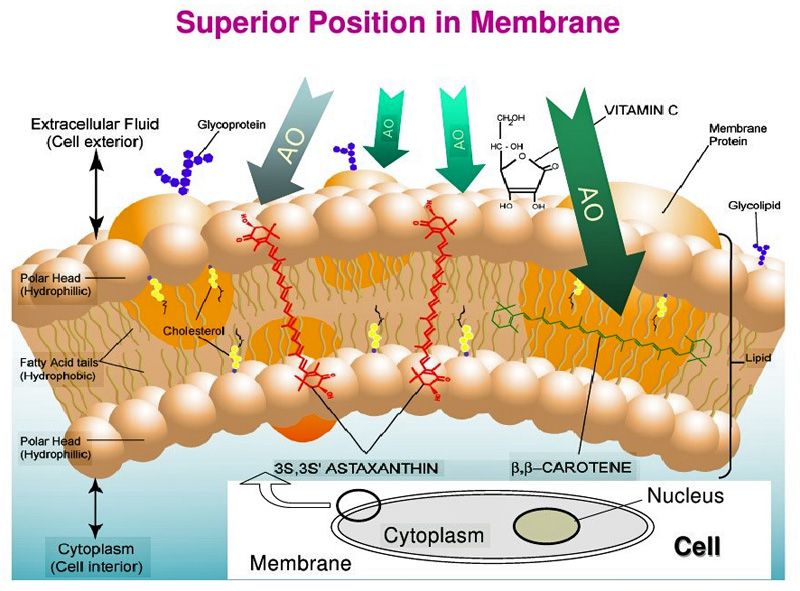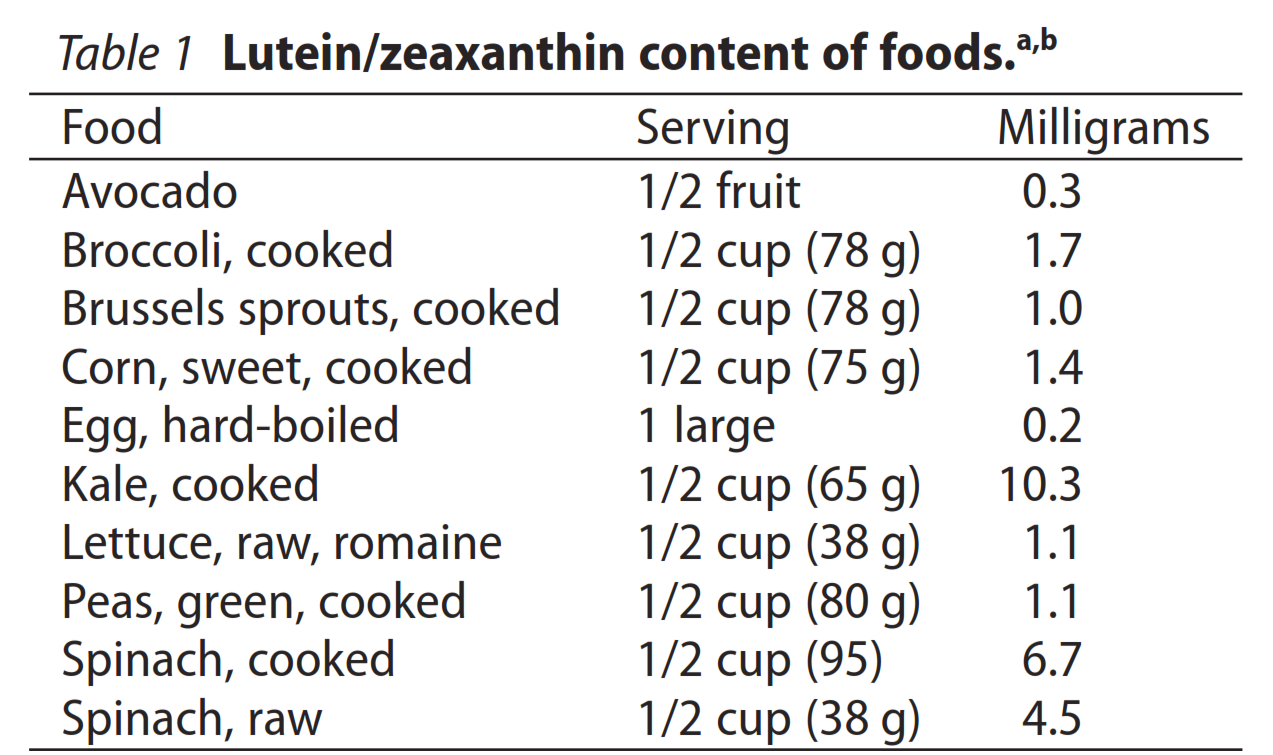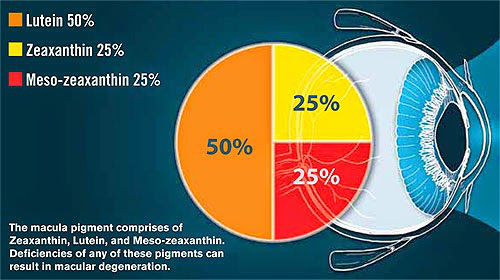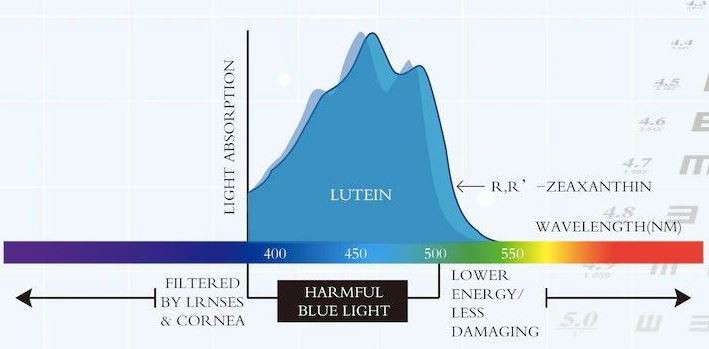Is lutein a Magic Bullet for cognition?
-
@izkrov - I have been reading more on this topic and it appears eating foods that contain lutein is not only brain-safe but also brain/cognition protective into old age.
A possible role for lutein and zeaxanthin in cognitive function in the elderly (2012)
Epidemiologic studies suggest that dietary lutein and zeaxanthin may be of benefit in maintaining cognitive health. Among the carotenoids, lutein and zeaxanthin are the only two that cross the blood-retina barrier to form macular pigment (MP) in the eye. They also preferentially accumulate in the human brain. Lutein and zeaxanthin in macula from nonhuman primates were found to be significantly correlated with their concentrations in matched brain tissue. Therefore, MP can be used as a biomarker of lutein and zeaxanthin in primate brain tissue. This is of interest given that a significant correlation was found between MP density and global cognitive function in healthy older adults. An examination of a relation between cognition and lutein and zeaxanthin concentrations in the brain tissue of decedents from a population-based study in centenarians found that zeaxanthin concentrations in brain tissue were significantly related to antemortem measures of global cognitive function, memory retention, verbal fluency, and dementia severity after adjustment for age, sex, education, hypertension, and diabetes. In univariate analyses, lutein was related to recall and verbal fluency, but the strength of the associations was attenuated with adjustment for covariates. However, lutein concentrations in the brain were significantly lower in individuals with mild cognitive impairment than in those with normal cognitive function. Last, in a 4-mo, double-blinded, placebo-controlled trial in older women that involved lutein supplementation (12 mg/d), alone or in combination with DHA (800 mg/d), verbal fluency scores improved significantly in the DHA, lutein, and combined-treatment groups. Memory scores and rate of learning improved significantly in the combined-treatment group, who also showed a trend toward more efficient learning. When all of these observations are taken into consideration, the idea that lutein and zeaxanthin can influence cognitive function in older adults warrants further study.
Role of lutein and zeaxanthin in visual and cognitive function throughout the lifespan (2014)
Abstract
The relationship between lutein and zeaxanthin and visual and cognitive health throughout the lifespan is compelling. There is a variety of evidence to support a role for lutein and zeaxanthin in vision. Lutein's role in cognition has only recently been considered. Lutein and its isomer, zeaxanthin, are taken up selectively into eye tissue. Lutein is the predominant carotenoid in human brain tissue. Lutein and zeaxanthin in neural tissue may have biological effects that include antioxidation, anti-inflammation, and structural actions. In addition, lutein and zeaxanthin may be protective against eye disease because they absorb damaging blue light that enters the eye. In pediatric brains, the relative contribution of lutein to the total carotenoids is twice that found in adults, accounting for more than half the concentration of total carotenoids. The greater proportion of lutein in the pediatric brain suggests a need for lutein during neural development as well. In adults, higher lutein status is related to better cognitive performance, and lutein supplementation improves cognition. The evidence to date warrants further investigation into the role of lutein and zeaxanthin in visual and cognitive health throughout the lifespan.
Oxidative stress is involved in age-related cognitive decline. The dietary antioxidants, carotenoids, tocopherols, and vitamin A may play a role in the prevention or delay in cognitive decline. In this study, sera were obtained from 78 octogenarians and 220 centenarians from the Georgia Centenarian Study. Brain tissues were obtained from 47 centenarian decedents. Samples were analyzed for carotenoids, 𝛼-tocopherol, and retinol using HPLC. Analyte concentrations were compared with cognitive tests designed to evaluate global cognition, dementia, depression and cognitive domains (memory, processing speed, attention, and
executive functioning). Serum lutein, zeaxanthin, and 𝛽-carotene concentrations were most consistently related to better cognition (𝑃 < 0.05) in the whole population and in the centenarians. Only serum lutein was significantly related to better cognition in the octogenarians. In brain, lutein and 𝛽-carotene were related to cognition with lutein being consistently associated with a range of measures. There were fewer significant relationships for 𝛼-tocopherol and a negative relationship between brain retinol concentrations and delayed recognition. These findings suggest that the status of certain carotenoids in the old may reflect their cognitive function. The protective effect may not be related to an antioxidant effect given that 𝛼-tocopherol was less related to cognition than these carotenoids. -
I'd say +1 for broccoli but someone might call me a fake-peater.
Nice thread Mr David. Grandma wasn't lying.
-
If we summarize:
Lutein and zeaxanthin in the eye (6 mg).
Vitamin E and b-carotene for vessel membranes (2 x 4mg) Vit E inside, B-carotene outside. (1)
Mainly lutein and carotenoid for the brain (+ lycopene).
Lycopene for prostate.
Note: I won’t take any supplement for B-carotene: No need and could be problematic if you smoke.

Useful info (in French, translator needed):- Vit E et peroxydation des membranes
http://mirzoune-ciboulette.forumactif.org/t642-vitamine-e-et-peroxydation-des-membranes#5645
Caution: - For vit E: at least 2 tocos. Too much of a good thing is bad.
- Polyphenols modify the microbiota. In cure, ok.
- Vit E et peroxydation des membranes
-
Eat lots of eggs daily
-
@bio3nergetic Raw or boiled?
-
@PrinceTrebata Egg yolks raw, whites very well cooked.
-
@PrinceTrebata said in Is lutein a Magic Bullet for cognition?:
@bio3nergetic Raw or boiled?
This question is relevant to vegetable sources of lutein as well.
Peatbot: Green leafy vegetables can be healthy, but there are some considerations to keep in mind. They are important sources of magnesium and vitamin K, and when cooked, they can provide a favorable balance of minerals such as magnesium, potassium, and calcium. Cooking is important because raw greens contain cellulose that encloses nutrients, making them inaccessible to our enzymes. Cooking breaks down the cellulose, making the nutrients more digestible.
However, raw leafy greens contain defensive chemicals that can block digestive enzymes, which can be problematic for some people. Cooking these vegetables thoroughly can help break down these toxins. Additionally, some leafy greens, like spinach, contain oxalic acid, which can interfere with calcium absorption.
Overall, while green leafy vegetables can be a healthy part of the diet, cooking them can enhance their nutritional benefits and reduce potential digestive issues.
-
@DavidPS said in Is lutein a Magic Bullet for cognition?:
Role of lutein and zeaxanthin in visual and cognitive function throughout the lifespan (2014)
While there is no recommended dietary intake for **lutein, intakes of approximately 6 mg/d have been associated with a decreased risk of age-related macular degeneration. The current intakes of lutein among adults fall well below this level, with average intakes of <2 mg/d for both men and women. Only men in the 99th percentile of lutein/zeaxanthin intake and women in the 95th percentile meet the dietary intakes that have been related to decreased risk of age-related macular degeneration. Therefore, there is a dietary gap between the intakes believed to be of benefit and the intakes being consumed. Increasing dietary lutein intake through healthy food choices could be an important public health strategy for reducing the risk of visual or cognitive impairment.
If a carnivore who wants to mono source all of their lutein from eggs, it looks like 30 eggs per day for the rest of their life would keep them in the zone (>6 mg/d).

-
@DavidPS another W for eggs
-
@DavidPS That's for hard boiled though I'm pretty sure high temps decrease lutein
-
Typical loss of Lutein+Zeaxanthin (as compared to raw food): 5% Freeze, 50% Dry, 25% Cook, 35% Cook+Drain, 10% Reheat.
Source: Nutritional Effects of Food Processing
http://nutritiondata.self.com/topics/processing
Freezing, Drying, Cooking, and Reheating.
Note: the results are often variable. -
@LucH - thank you, this is very useful information.
-
@asterbolic - A 25-35% reduction in lutein will still require lot of raw eggs every day to meet the 6 mg/d level. Only men in the 99th percentile of lutein/zeaxanthin intake and women in the 95th percentile meet the dietary intakes that have been related to decreased risk of age-related macular degeneration and cognitive impairment.
There are several safety issues with eating raw eggs. Is Eating Raw Eggs Safe and Healthy?
Since raw eggs deplete biotin, see also
Is Biotin as Good as Advertised for Your Hair Loss? -
 D DavidPS referenced this topic on
D DavidPS referenced this topic on
-
A 2024 review article - Beyond food colouring: Lutein-food fortification to enhance health
-
 D DavidPS referenced this topic on
D DavidPS referenced this topic on
-
@LucH said in Is lutein a Magic Bullet for cognition?:
Typical loss of Lutein+Zeaxanthin (as compared to raw food): 5% Freeze, 50% Dry, 25% Cook, 35% Cook+Drain, 10% Reheat.
Source: Nutritional Effects of Food Processing
http://nutritiondata.self.com/topics/processing
Freezing, Drying, Cooking, and Reheating.
Note: the results are often variable.Thanks for the info, though this contradicts what @DavidPS posted above, where cooked spinach has more lutein than raw.
-
@Mossy said in Is lutein a Magic Bullet for cognition?:
Thanks for the info, though this contradicts what @DavidPS posted above, where cooked spinach has more lutein than raw.
I suppose it varies from different studies and what is found in the ground.
-
@LucH said in Is lutein a Magic Bullet for cognition?:
@Mossy said in Is lutein a Magic Bullet for cognition?:
Thanks for the info, though this contradicts what @DavidPS posted above, where cooked spinach has more lutein than raw.
I suppose it varies from different studies and what is found in the ground.
Yes. I'm also considering that the 1/2 cup is volume, where cooked spinach shrinks, hence the higher weight in grams to the right.
-
-
@DavidPS and others
Remind that when eating spinach, you need a lot of calcium and citrates because it's very high in oxalates. +/ 600 mg for 100 gr.
The body can only manage 50 mg per day; 150-200 mg is often taken but what is higher than 50 mg is taken away in urine (citrate) and in stools (calcium).
I never take more than 200-250 mg Ca element. When I eat spinach, I mix it with my meal (potato, spinach or broccoli, 1 egg (or egg yolk), a small onion lightly cooked, and spices) + 4 oz. beef (100-110 g).
I take then once 1000 mg citrate calcium tablet (big one) if I haven't got enough calcium for the day (1200 instead of 850 mg Ca) or I take 2 doses (2.5 g x 2) potassium citrate powder.
The optimal minimal ratio Ca / Ox is 1/3. So in theory 200 mg Ca per 100 gr spinach (600 mg oxalates).
Mind for lithiasis if you don't manage well. And when you don't balance well with other minerals, if deficit in base, you're going to excite PTH and bone remodeling.
Edit: 200 mg Ca element is not the same as 200 mg calcium citrate. There is +/ 30 % Ca element in Ca citrate.
Note: Calcium to magnesium ratios <1.7 and >2.8 can be detrimental, and optimal ratios may be ∼2.0 for bone mineral density.
Taking calcium alone does not stop or even slow bone loss and does not prevent osteoporosis according to recent studies. Need for Mg element 480 mg target. -
Useful info
Interactions between vitamins A, D, E, and K
http://www.westonaprice.org/health-topics/abcs-of-nutrition/nutritional-adjuncts-to-the-fat-soluble-vitamins/
Summary
• Vitamins A, D, and K2 interact synergistically to support immune health, provide for adequate growth, support strong bones and teeth, and protect soft tissues from calcification.
• Magnesium is required for the production of all proteins, including those that interact with vitamins A and D.
• Vitamins A and D support the absorption of zinc and zinc supports the absorption of all the fat-soluble vitamins.
• Many of the proteins involved in vitamin A metabolism and the receptors for both vitamins A and D only function correctly in the presence of zinc.
• Dietary fat is necessary for the absorption of fat-soluble vitamins.
• Vitamin K2 activates proteins by adding carbon dioxide to them. We can increase carbon dioxide production by consuming carbohydrates, exercising, and maintaining robust thyroid status.
• The fat-soluble vitamins thus interact not only with each other, but with other nutrients and metabolic factors as well. This level of complexity should urge us to exercise caution when interpreting scientific research, and to cooperate with the wisdom of nature by obtaining vitamins through nutrient-dense foods.
Throughout the twentieth century, we viewed the fat-soluble vitamins in isolation from one another. Researchers relegated vitamin K to blood coagulation, and ignored vitamin K2 entirely because it is present in such small quantities in the diet. Vitamins A and D each fell in and out of favour, the popularity of one always rising at the expense of the other. Ignoring the forest to study one tree at a time, the concept of synergy eluded us.
In order to truly understand the fat-soluble vitamins, however, we must understand that vitamins A, D, and K cooperate synergistically not only with each other, but also with essential minerals like magnesium and zinc, with dietary fat, and with key metabolic factors like carbon dioxide and thyroid hormone.
Link: Bone remodeling and modeling (role of cells osteoclasts for resorption; cells osteoblasts have the role to remodel new bones to repair damage)
Youtube Video

